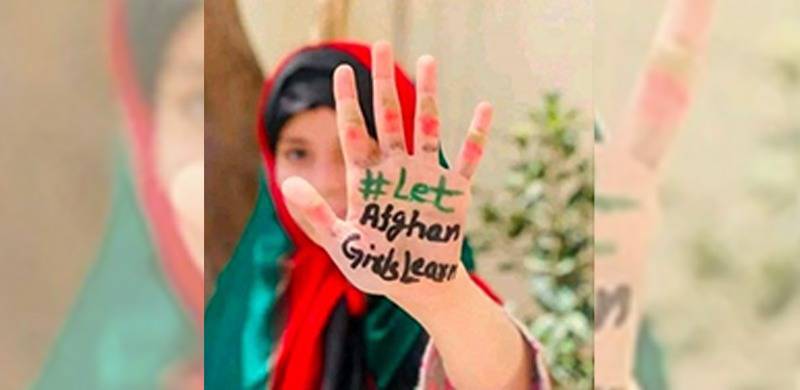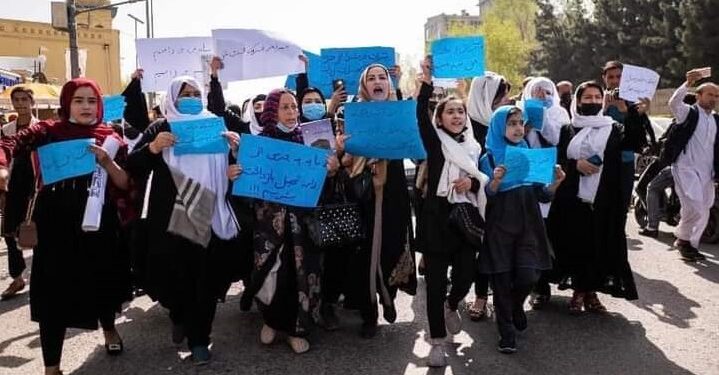
The Afghan Taliban recently issued a notification banning girls from attending educational institutions, after which there has been a strong reaction from around the world.
The female students of Afghanistan are protesting for their rights after the notification, and they are also facing psychological pressure alongwith deprivation of education.
Naveeda Hafizi, a student of political science in Afghanistan, told The Friday Times that the Taliban are promoting their political ideology by banning girls' education, but keeping girls out of education will mean dragging the country down.
She added that "keeping girls away from education means depriving more than half of Afghanistan's population of their rights. It is our basic human right and we need equal representation in every institution. Many international organisations are silent on this issue but we will continue our struggle for our rights."
Farah Naz Alkozai, an Afghan journalist and women rights' activists said that girls in Afghanistan are currently going through a psychological crisis and they are facing fear for their future; how will they continue their studies?
Those who work in other fields are worried about their livelihood and the future of their children, she maintained.
Alkozai added that ever since the Taliban took over the government, they have focused only on women, banning girls' education and limiting the role of women in the society.
"Women have an important role in society, Afghan women have all the rights that other human beings have in the world, Islam has also given women the right to education, then on what grounds have the Taliban banned their education?" she asked.

Marzia Hafizi, an Afghan journalist and women rights' activist said such steps will male the Taliban distant from the people. If the Taliban want to rule Afghanistan and save the country from harsh conditions and go along with the international community, they need to reform and change their governance.
"Girls do not carry arms nor do they fight but they are raising their voices peacefully for their basic rights and it will pay off one day," the activist hoped.
Apart from education, there is a need for women's representation in every sector so that they can serve other women, listen to their problems and solve them.
Hafizi stressed that the current situation and what the current government is doing is not in the interest of Afghanistan and the people; this situation can push the country towards a civil war.
Rahatullah Shafaqzoy, a global peace ambassador and women rights' activist in Afghanistan said that in a democratic government, women were working in all fields, but the Taliban have stopped them from working, which not only deprived them of their rights but also caused them financial and mental problems.
He added that the lives of women as well as common people have been adversely affected, and highlighted that for those who want to go to foreign countries, the passport conditions are strict and the fees is increased, which is highly unfortunate.
The Minister of Higher Education of the Islamic Emirate Afghanistan, Nada Muhammad Nadeem has said in one of his statements that the current education system is not compatible with Afghan culture; Hijab is obligatory and women will be given as many rights as Islam has given them.
Meanwhile, Mufti Shahabuddin Popalzai, an Islamic scholar from Peshawar, has said in his tweets that if veiling of women is the order of Allah, then the acquisition of knowledge is also a duty.
He says that the philosophy and thought of banning women to not go out of their homes is un-Islamic. It may be a tradition and custom of a region, but it has nothing to do with Islam, he said.
Popalzai further said that banning women's education on the pretext of veiling is against Islam and the teachings of the Quran and Sunnah and it should not be allowed.
Sohail Ahmad Danish is a Peshawar-based journalist covering human rights and social issues for different media outlets.
The female students of Afghanistan are protesting for their rights after the notification, and they are also facing psychological pressure alongwith deprivation of education.
Naveeda Hafizi, a student of political science in Afghanistan, told The Friday Times that the Taliban are promoting their political ideology by banning girls' education, but keeping girls out of education will mean dragging the country down.
She added that "keeping girls away from education means depriving more than half of Afghanistan's population of their rights. It is our basic human right and we need equal representation in every institution. Many international organisations are silent on this issue but we will continue our struggle for our rights."
Farah Naz Alkozai, an Afghan journalist and women rights' activists said that girls in Afghanistan are currently going through a psychological crisis and they are facing fear for their future; how will they continue their studies?
Those who work in other fields are worried about their livelihood and the future of their children, she maintained.
Alkozai added that ever since the Taliban took over the government, they have focused only on women, banning girls' education and limiting the role of women in the society.
"Women have an important role in society, Afghan women have all the rights that other human beings have in the world, Islam has also given women the right to education, then on what grounds have the Taliban banned their education?" she asked.

Marzia Hafizi, an Afghan journalist and women rights' activist said such steps will male the Taliban distant from the people. If the Taliban want to rule Afghanistan and save the country from harsh conditions and go along with the international community, they need to reform and change their governance.
"Girls do not carry arms nor do they fight but they are raising their voices peacefully for their basic rights and it will pay off one day," the activist hoped.
Apart from education, there is a need for women's representation in every sector so that they can serve other women, listen to their problems and solve them.
Hafizi stressed that the current situation and what the current government is doing is not in the interest of Afghanistan and the people; this situation can push the country towards a civil war.
Rahatullah Shafaqzoy, a global peace ambassador and women rights' activist in Afghanistan said that in a democratic government, women were working in all fields, but the Taliban have stopped them from working, which not only deprived them of their rights but also caused them financial and mental problems.
He added that the lives of women as well as common people have been adversely affected, and highlighted that for those who want to go to foreign countries, the passport conditions are strict and the fees is increased, which is highly unfortunate.
The Minister of Higher Education of the Islamic Emirate Afghanistan, Nada Muhammad Nadeem has said in one of his statements that the current education system is not compatible with Afghan culture; Hijab is obligatory and women will be given as many rights as Islam has given them.
Meanwhile, Mufti Shahabuddin Popalzai, an Islamic scholar from Peshawar, has said in his tweets that if veiling of women is the order of Allah, then the acquisition of knowledge is also a duty.
He says that the philosophy and thought of banning women to not go out of their homes is un-Islamic. It may be a tradition and custom of a region, but it has nothing to do with Islam, he said.
Popalzai further said that banning women's education on the pretext of veiling is against Islam and the teachings of the Quran and Sunnah and it should not be allowed.
Sohail Ahmad Danish is a Peshawar-based journalist covering human rights and social issues for different media outlets.

